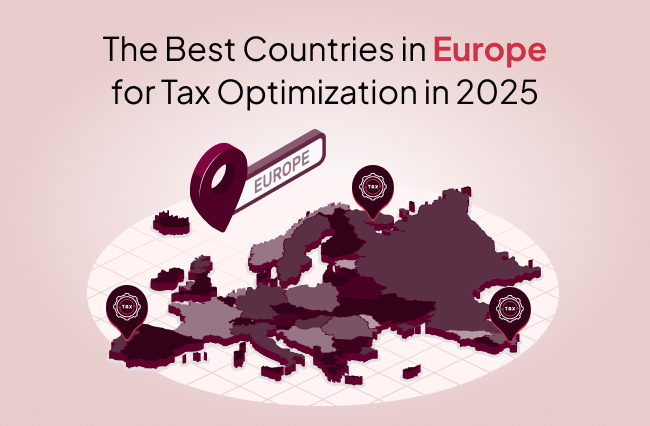The Best Countries in Europe for Tax Optimization in 2025

As global tax policies evolve in response to digitalization, transparency demands, and the OECD’s global minimum tax rules, entrepreneurs and corporations alike are rethinking their international structures. For businesses operating or expanding in Europe, tax optimization is no longer just a bonus it’s a strategic imperative. Tax optimization involves structuring your operations to take advantage of legal tax incentives, favorable corporate rates, and bilateral treaties while remaining fully compliant with local and EU regulations. It is not tax avoidance, but a way to build tax-efficient, competitive entities in an increasingly complex environment.
In this guide, we explore the best European countries for tax optimization in 2025, focusing on start-up-friendly jurisdictions, innovation incentives, and cost-efficient corporate structures all within the bounds of EU and international compliance.
Key Factors to Consider When Choosing a Tax-Efficient Jurisdiction
Before we dive into specific countries, here are some key factors start-ups and expanding businesses should consider when selecting a jurisdiction for tax optimization:
-
Corporate tax rates
Lower headline tax rates are appealing, but effective rates (after deductions, exemptions, and credits) matter more.
-
Double taxation treaties (DTTs)
A country with a broad Double Tax Treaty (DTT) network can reduce or eliminate withholding taxes on cross-border dividends, royalties, and interest.
-
Withholding tax rules
Certain jurisdictions offer 0% withholding tax for non-resident shareholders, which significantly lowers your global tax burden.
-
R&D and innovation incentives
Many countries offer tax credits or deductions for research, software development, and income related to intellectual property (IP).
-
Holding company structures
Ideal for managing multiple subsidiaries and investments with minimal tax leakage.
-
Substance requirements
Post-BEPS, many countries now require actual business activity to support tax residency claims.
-
Legal transparency and administration
Ease of compliance, digital infrastructure, and start-up-friendly policies are essential.
Top 7 European countries for tax optimization in 2025
-
Bulgaria
- Corporate Tax Rate: 10% flat, the lowest in the EU.
- Advantages: No local shareholder requirement, low operational costs, strong DTT network.
- Ideal for: Holding companies, tech start-ups, and outsourcing hubs.
Bulgaria offers a highly efficient tax framework, excellent for entrepreneurs and SMEs seeking a compliant, low-tax base in the EU. With no local ownership requirements and straightforward incorporation processes, it’s a top choice for cost-conscious businesses.
-
Ireland
- Corporate Tax Rate: 12.5% for trading income; 25% for non-trading income.
- Advantages: Robust R&D tax credits, Intellectual Property (IP) planning tools, excellent EU–US relations.
- Ideal for: SaaS businesses, financial services, and high-growth start-ups.
Company Formation in Ireland is extremely popular among global tech companies. Ireland offers EU market access, an ordinary law jurisdiction, and favourable tax treatment for R&D and IP-intensive operations. It also adheres to EU standards while maintaining a business-first tax system.
-
Hungary
- Corporate Tax Rate: 9%, % lowest in Europe (headline rate).
- Advantages: Generous loss carry-forwards, low employer social taxes, flexible dividend treatment.
- Ideal for: SMEs, logistics firms, and real estate investors.
Hungary’s strategic location in Central Europe and ultra-low tax rate make it a hidden gem. It’s especially effective for businesses that expect significant reinvestment or dividend distribution flexibility.
-
Cyprus
- Corporate Tax Rate: 12.5%
- Advantages: No withholding tax on dividends to non-residents, 0% tax on capital gains (with conditions), access to EU DTTs.
- Ideal for: International holding structures, digital businesses, and fintech.
Company Formation in Cyprus remains a strategic move for companies seeking legal certainty and tax efficiency. Cyprus also offers an excellent IP box regime and exemption on dividend income under specific conditions.
-
Estonia
- Corporate Tax Rate: 0% on retained earnings; 20% only when profits are distributed.
- Advantages: Fully digital incorporation, efficient tax reporting, excellent start-up ecosystem.
- Ideal for: Remote-first businesses, tech start-ups, and solo founders.
Estonia’s digital governance model makes it one of the most business-friendly places in Europe. As long as profits are reinvested, companies pay no corporate tax, making this ideal for high-growth start-ups.
-
Netherlands
- Corporate Tax Rate: 19% (up to €200,000); 25.8% for higher income.
- Advantages: Strong holding company framework, participation exemption, and extensive double tax treaty (DTT) network.
- Ideal for: Multinationals, e-commerce, and logistics firms.
The Netherlands remains a central hub for European operations, particularly for businesses seeking to centralize control under a Dutch BV. Although tax rates are moderate, benefits like the participation exemption and IP regimes make it tax-efficient in practice.
-
Malta
- Corporate Tax Rate: 35%, but effective tax can drop to 5–10% after refunds.
- Advantages: Attractive refund mechanism for foreign shareholders, tax treaties, and robust financial infrastructure.
- Ideal for: IP-driven businesses, holding companies, and licensing models.
Malta offers a unique system that allows international shareholders to claim significant tax refunds, resulting in an effective corporate tax rate that is very low with proper structuring. It’s widely used for licensing and IP models across the EU.
Countries to approach with caution in 2025
While many jurisdictions offer advantages, some are undergoing regulatory shifts that could impact tax strategies:
- United Kingdom: Post-Brexit divergence, rising corporate tax rates, and loss of certain EU benefits.
- Switzerland: OECD Pillar Two pressures have led to adjustments in cantonal tax rates.
- Luxembourg: Scrutiny over state aid rulings and stricter substance requirements.
How OAEC helps you choose the right jurisdiction?
We understand that choosing where to incorporate is more than a tax decision; it’s a strategic one. That’s why we provide:
Jurisdiction comparison support
Side-by-side analysis of tax rates, start-up incentives, DTTs, and setup costs.
Custom incorporation & consultation
We tailor every setup to your business structure, goals, and industry.
Compliance & substance planning
Ensure you meet local substance requirements and reporting obligations.
Holding company structures
Ideal for managing multiple ventures across different EU countries.
Integration of services
Including accountancy support, registered address setup, and bank account opening.
Conclusion:
Tax optimization in Europe involves aligning your business strategy with the appropriate legal, financial, and operational framework. Whether you are launching a new start-up, managing global IP, or expanding a multinational presence, choosing the proper jurisdiction in 2025 can reduce tax liability, simplify compliance, and support scalability.
Additionally, the best European countries for tax optimization will always depend on your goals, but working with experienced professionals ensures you make informed, future-proof decisions. Start your journey today with a trusted partner in tax-smart European expansion.
The post The Best Countries in Europe for Tax Optimization in 2025 appeared first on Open a European Company.












































